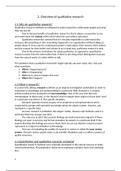2. Overview of qualitative research
2.1 Why do qualitative research?
Qualitative research methods are designed to help researchers understand people and what
they say and do.
One of the key benefits of qualitative research is that it allows a researcher to see
and understand the context within which decisions and actions take place.
Qualitative researcher contend that it is virtually impossible to understand why
someone did something or why something happened in an organization without talking to
people about it. If you want to understand people’s motivations, their reasons, their actions,
and the context for their beliefs and actions in an in-dept way, qualitative research is best.
One of the primary motivations for doing qualitative, as opposed to quantitative,
research comes from the observation that, if there is one thing which distinguishes humans
from the natural world, it is their ability to talk.
The questions that a qualitative researcher might typically ask ware what, why, how and
when questions:
What is happening here?
Why is it happening?
How has it come to happen this way?
When did it happen?
2.2 What is research?
In a university setting, research is defines as an original investigation undertaken in order to
contribute to knowledge and understanding in a particular field. Research is a creative
activity leading to the production of new knowledge. New in the way that the facts,
interpretation of those facts, or the theories used to explain them might not have been used
in a particular way before in that specific discipline.
Research typically involves enquiry of an empirical or conceptual nature and is
conducted by people with specialist knowledge about the subject matter, theories, and
methods in a specific field.
As more research is published, the subject matter, theories and methods used in a
particular field may change over time.
The only way to tell if the research findings are both sound and original is if those
findings are open to scrutiny and formal evaluation by experts in a particular field. If the
experts find that the findings are new to them, then we can say that the research project
represents an original contribution to knowledge.
This way of evaluating the quality of research in science is called the peer review
system. The peer review system exists in all scientific disciplines and is in effect a system of
quality assurance.
2.3 Quantitative and qualitative research compared
Quantitative research methods were originally developed in the natural sciences to study
natural phenomena. All quantitative researchers emphasize numbers more than anything
else.
1
,Examples of qualitative and quantitative research
Qualitative research: A focus on text Quantitative research: a focus on numbers
Action research Surveys
Case study research Laboratory experiments
Ethnography Simulation
Grounded theory Mathematical modelling
Semiotics Structured equation modelling
Discourse analysis Statistical analysis
Hermeneutics Econometrics
Narrative and metaphor
Qualitative research methods were developed in the social sciences to enable researchers
to study social and cultural phenomena. Qualitative data sources include observations and
participant observation (fieldwork), interviews etc.
In the 1980s most business disciplines favored quantitative research. In the 1990s,
there was an increased interest in qualitative research in almost every business discipline.
Quantitative research is best if you want to have a large sample size and you want to
generalize to a large population. In this case the objective is to study a particular topic
across many people or many organizations. A major disadvantage is that, as a general rule,
many of the social and cultural aspects of the organizations are lost or are treated in a
superficial manner.
Qualitative research is best if you want to study a particular subject in depth. A
major disadvantage is that it is often difficult to generalize to a larger population. You can
generalize from qualitative research, but not by using sampling logic. It is normally
impossible for qualitative researchers to make generalization from a sample to a population.
2.4 Triangulation
Triangulation is the idea that you should do more than just one thing in a study. You should
use more than one research method, use two or more techniques to gather data, or
combine qualitative and quantitative research methods in the one study. It allows you to
gain a ‘fuller’ picture of what is happening.
It is relatively common for qualitative researchers to triangulate data within a study
using just one research method.
Much less common, and much more difficult, is when researchers try to combine
two or more research methods in the one study. The idea is to triangulate data and findings
on the same topic, but to use different methods. It is difficult to do this kind of triangulation
well, because you need to be well trained.
An easier way to achieve the triangulation of research methods if for a single study
to include multiple researchers. Each researchers brings to the table his or her own method
of expertise and experience.
2.5 Research in business and management
All research in business and management focuses on a topic that is of relevance to one or
more of the business and management disciplines. This disciplinary area is very broad.
A key feature of a qualitative or quantitative study, as opposed to a purely
conceptual study, is that it is an empirical investigation, i.e. it relies on empirical data from
2
,the natural or social world. The empirical investigation seeks to contribute to the body of
knowledge in a particular field.
As can be seen in the figure, a
researcher finds a topic or a
research problem that is relevant
to the body of knowledge in a
particular discipline. Normally,
the research questions are
derived from the research
literature, but they could come
from current business practice or your own intuitive hunches.
2.6 Rigour and relevance in research
A perennial issue for researchers in business and management is the apparent trade-off
between rigour (strengheid) and relevance.
Rigorous research Relevant research
‘scientific research’ Relevant to business practitioners
Emphasis on meeting scientific standards Emphasis on being immediately relevant to
such as validity and reliability. practice.
Subject to academic peer review
Published in academic journals Published in consulting report of industry
magazines
Theoretical contribution Practical contribution
Rigorous research is usually defines as research that meets the standards of ‘scientific’
research; it is research that has been conducted according to the scientific model of
research, subject to peer review, and published in an academic journal.
Relevant research is usually defined as research that is of immediate relevance to
business professionals. The research results can be used right away. Much of this kind of
research is difficult, if not impossible, to get published in academic journals in business and
management. The lack of a theoretical contribution almost guaranteed rejection.
3
, 3. Research design
3.1 Introduction
A research design is he plan for an entire qualitative research project. The main purpose is
to provide a road map of the whole research project. Another purpose is to convince your
potential supervisor(s), advisory committee, department, school, and/or research funding
committee that you are capable of doing the research and that your research project is
viable.
3.2 Choosing a topic
Before you start designing a qualitative research project, you decide a topic. There are three
important requirements in deciding upon a topic:
1. You are interested in the topic
2. A faculty member is prepared to supervise you.
3. You can obtain relevant qualitative data on the topic.
Once you have decides upon a topic, the next task is to develop one or more research
questions. The questions should be designed to solve a research problem.
The steps:
3.3 Theoretical framework
After you have chosen a topic and generated a list of potential research questions, the next
stage of research design is to choose a theoretical framework. In practice, many
researchers change their theoretical framework or choose their theoretical framework
much later on.
There are many different theoretical frameworks that can be used, from grand
sociological theories, such as structuration theory or actor network theory, through to mid-
range or lower-level theories, such as transaction cost theory of the theory of planned
behavior.
Usually the best place to find a suitable theoretical framework is from the research
literature.
It is commonly assumed that qualitative research is more suited to theory-building,
qualitative research methods can be used to test theory.
4






